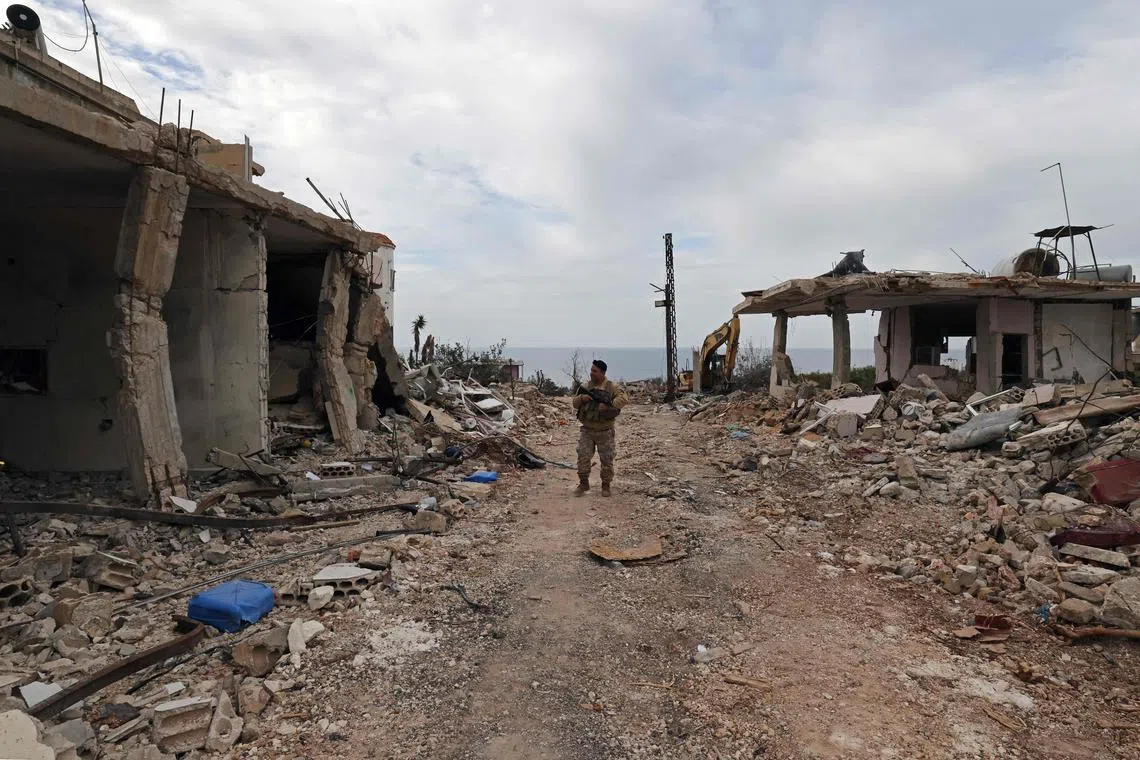Israel-Hezbollah truce set to be extended beyond next week
Sign up now: Get ST's newsletters delivered to your inbox

A Lebanese soldier patrolling a residential area that was devastated by the war between Israel and Hezbollah.
PHOTO: AFP
JERUSALEM – The ceasefire agreement that paused the war between Israel and the Hezbollah
The Iran-backed group and Israel are unlikely to resume full-scale fighting despite needing more time to implement the original terms of the truce, which started in late November, according to Lebanese, Israeli and French government officials involved in ongoing talks.
The French- and US-backed deal, which halted a conflict that has killed thousands of people and worsened tensions between Iran and Israel, gave Israeli troops 60 days to pull out of southern Lebanese villages.
Hezbollah was required to withdraw north of the Litani River, with the Lebanese army replacing them.
The pact was followed last week by Israel and Hamas – another Islamist militia sponsored by Iran – agreeing to pause their war in Gaza.
While the Lebanon truce has broadly held since November, Hezbollah and Israel have accused each other of breaking the terms
Israeli forces are still in at least half the villages they occupied, according to the country’s officials.
Israel has kept up lethal strikes to counter what it describes as Hezbollah’s attempts to regroup or rearm in the south, and in retaliation for mortar attacks.
Negotiations between the parties have been taking place on extending the Jan 27 deadline to ensure the conflict is not resumed, said a senior Israeli diplomat.
French officials and a person familiar with the discussions in Lebanon said the truce will be lengthened to allow more time for Lebanese soldiers to be deployed and for Hezbollah to clear out to the north of the Litani, about 30km from the border.
The US embassy in Beirut did not immediately respond to a request for comment.
All of the officials asked not to be named, reflecting the sensitivity around the indirect diplomacy between Israel and Hezbollah, which like Hamas is designated a terrorist organisation by the US.
In addition, Israel and Lebanon have no diplomatic relations and cannot negotiate without mediators.
The fighting between Israel and Hezbollah caused extensive damage to both economies.
Israeli assets – including the shekel and government bonds – rallied significantly in the run-up to the ceasefire, while Lebanon’s defaulted dollar bonds have surged since then, a time when the country also elected its first president since 2022. The debt remains in distressed territory.
“We want the successful implementation of the ceasefire agreement,” Israeli Foreign Minister Gideon Saar told reporters on Jan 20 alongside Mr Antonio Tajani, his counterpart from Italy, which contributes forces to the United Nations’ peacekeeping operation in southern Lebanon.
Mr Saar said more territory would be ceded to the Lebanese army soon, but that any wider Israeli pull-out was conditional on Hezbollah first leaving the south.
“They breached the agreement, and we still have Hezbollah terrorists south of the Litani River,” he said. “We will enforce when we see violations of the agreement, and we will stand on our security demand.”
Lebanon has repeatedly said it is committed to the ceasefire deal, though it has stressed that Israel needs to withdraw its troops.
Hezbollah leader Naim Qassem has urged the Lebanese state to address repeated Israeli violations.
While Hezbollah still has plenty of fighters and arms, it was heavily weakened during the conflict.
A series of skirmishes – begun when Hezbollah fired on Israel in October 2023 in solidarity with Hamas after the war in Gaza erupted – turned into a full-blown conflict in September 2024.
Israel sent troops into southern Lebanon, killed Hezbollah’s longstanding leader Hassan Nasrallah
Earlier in January, Lebanese lawmakers elected army commander Joseph Aoun as the country’s president. Mr Aoun was backed by the US and Saudi Arabia, and his victory was a further sign of the waning influence of both Hezbollah and Iran in Lebanese politics.
Still, even if the truce is extended, the continued presence of Israeli troops in Lebanon could put pressure on Mr Aoun. BLOOMBERG


